Arts & Culture

I’ve told you there are wolves out here.
Don’t you believe me?
You could fall in a hole
too deep to climb out of.
You could slip on wet rocks
and fall into the river and drown.
Good thing I noticed
your pink nose was missing.
Good thing I turn around
to check on what’s behind me.
Remember that leading the flock
I look forward to find tender grass.
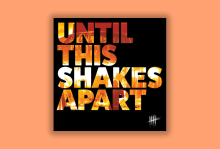
UPBEATS AND BEATDOWNS, the first album by the Denver-based band Five Iron Frenzy, opens with a song about the evil of manifest destiny and the genocide of Native people. In the second song, the protagonist gives all his money to a homeless man. The fourth track is about refusing to pledge allegiance to the American flag. This was in 1996. On an album sold primarily in Christian bookstores, by a band that played evangelical church basements.
Five Iron Frenzy is still making music and, earlier this year, put out the most caustically political album of their career, Until This Shakes Apart. Released days after the Capitol insurrection, the album pulls no punches in its criticism of evangelicals’ embrace of Trumpian politics. And the band has never sounded better.
After their sloppy, fun ska-punk days in the ’90s and their hit-and-miss, genre-hopping experiments in the early 2000s, the band broke up, reformed in 2011, and released the mature and muscular Engine of a Million Plots in 2013. Rejoined with songwriter Scott Kerr (who had left the band in 1998), the band found new purpose and energy as its songs became more introspective. The result was a record more in the vein of Jimmy Eat World than third-wave ska, ending with a song about uncertainty and hope rather than their previous, hymn-like closers. The band remains loud and dark, but Until This Shakes Apart is more explicitly influenced by older forms of ska, like reggae and two-tone. And where Engine of a Million Plots was introspective, this album points the finger outward. No one is safe from singer Reese Roper’s critique on this record, each song unleashing righteous anger at a different target: heartless immigration policy, gentrification of the band’s hometown, the Confederate flag, oil profiteering, and so much more.
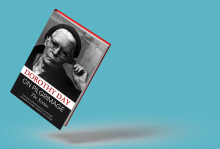
LOVE IS LACED liberally through this compendium, skillfully edited by Robert Ellsberg, of Dorothy Day’s monthly columns from The Catholic Worker, the newspaper of the movement Day co-founded. Love for God, especially as it lives in the poor whose burdens of poverty she tried to share, shines through Day’s accounts of her travels and her life at the Catholic Worker houses of hospitality in New York and the community’s farms. Seeing examples of living love seems even more important today as our country faces the same problems as in the ’60s: racism, poverty in a land of plenty, and endless wars that consume needed resources.
Day writes of these issues, but love as lived through acts of mercy is what unites the essays. She describes Catholic Worker houses of hospitality across the country where, daily, the hungry are fed, the naked are clothed, the dead are mourned and buried, and the sick and the imprisoned are visited. In these essays, these acts are presented in opposition to works of war and racism. She documents that the latter are fueled by an out-of-control U.S. military whose expenditures rob the poor.
Coming in for special notice are prisoners of conscience, Day’s colleagues who are imprisoned for resisting the draft that fueled the Vietnam War, including, in 1968, burning draft files in Catonsville, Md., and Milwaukee, in nonviolent destruction of what Jesuit priest Dan Berrigan called “improper property.” These nonviolent trespasses against the law by the anti-war and civil rights movements were in obedience to God’s laws. After several good recent biographies of Day, reading again the words that first introduced me to the Catholic Worker movement brought back memories of those days when Day helped so many commit to nonviolence as a way to make a world where, as her mentor Peter Maurin would say, “it’s easier for people to be good.”

NEARLY EVERYONE I know is moving. Homes that were once beloved, or at least tolerable, now represent forced encampment. Like rats departing a sinking ship, many of us are running from the wreckage of 2020 with little more than the clothes on our backs and enough money for a security deposit. Change is in the air. Yet, as the adage goes, “The more things change …” Cells renew, but bones remain.
The image on a postcard on my desk, taken by the infamous Carl Van Vechten, is Georgia O’Keeffe next to one of her iconic cow skulls. Her eyes are closed as she cradles the skull in her hand and leans her head against it. The gesture, almost reverent in its grace, seems to acknowledge the animal who once was. The picture is a study in contrast, much like O’Keeffe’s life. According to the postcard, the photo was captured at O’Keeffe’s New York penthouse in 1936. By this point, she’d already made her first pilgrimages to the American Southwest, a region that would provide her with artistic inspiration until her death in 1986. It was also a refuge from the stress of her marriage to the influential photographer and philanderer Alfred Stieglitz. Maybe it’s fitting then that one of the few O’Keeffe pieces I’ve seen in person is related to her attempts to find sanctuary.
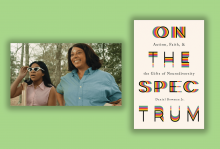
Tree Rings
The three short films in The Trees Remember series span 60 years and feature Black women in the outdoors, reframing narrow historical narratives of who has access to nature. Directed by Angela Tucker, they portray memory, relationships, and belonging in the outdoors. TuckerGurl Inc.
Unique Pathways
On the Spectrum: Autism, Faith, and the Gifts of Neurodiversity chronicles author Daniel Bowman Jr.’s life as an autistic Christian, starting from his unexpected diagnosis at 35. Illuminating the ways that neurodiversity enriches us all, this book debunks misconceptions and offers hope. Brazos Press.

NO MATTER YOUR racial, ethnic, spiritual, or geographic background, or where you fall on the gender spectrum, a vital part of adulthood is determining your identity—particularly in relationship to the community you grew up in. At some point, we all diverge from others’ opinions of us. Hopefully, we also find people who help us in our quest to define ourselves.
The Peacock series We Are Lady Parts, about an all-female, Muslim punk band, shows a group of characters who support each other on their individual journeys of identity, with their religion and larger community playing central roles. The series, created and written by Nida Manzoor, presents a diverse look at modern-day Muslim womanhood. Its themes also carry over into the broader experience of maturing alongside your faith, and what happens when your expression of belief conflicts with cultural expectations.
Lady Parts is fronted by the fierce feminist Saira (Sarah Kameela Impey). Earthy mom Bisma (Faith Omole) plays bass, and aggressive Ayesha (Juliette Motamed) is on drums. Momtaz (Lucie Shorthouse), often shown vaping through her niqab, is their manager. Saira decides the band needs a lead guitarist, eventually selecting Amina (Anjana Vasan), a painfully shy, tightly wound Ph.D. student.

WHEN AUTHOR AND film critic Sarah Welch-Larson was growing up, she wasn’t a horror movie fan. That started to change when, as a teenager, she had a fateful encounter with the James Cameron film Aliens on cable TV.
The movie’s hero, Ellen Ripley, played by Sigourney Weaver, “looked a lot like my mom and had a lot of the attitudes my mom has about some things,” Welch-Larson, who writes about faith and popular culture for the online publications Think Christian and Bright Wall/Dark Room, told Sojourners. “I was captivated by that character.” Two weeks later, Welch-Larson watched the first 1979 Alien movie, directed by Ridley Scott. It frightened her and she couldn’t get it out of her head.
Eventually Welch-Larson’s interest grew into a fascination with the series as a whole. Her new book, Becoming Alien: The Beginning and End of Evil in Science Fiction’s Most Idiosyncratic Film Franchise, looks at recurring themes of evil, greed, and destruction in the Alien films through the lens of theologian Catherine Keller’s 2002 book, The Face of the Deep: A Theology of Becoming, in which Keller examines the first two verses of Genesis.
“She writes a lot about God setting everything into relationship with each other. God’s saying there’s a relationship you have with the rest of the world and with other created beings around you,” Welch-Larson explains. “Once you start to deny those relationships, you’re saying they’re not as important as what God has created you to be, and Keller says that’s the source of evil.”

Theology isn’t the only place we overlook the feminine.

I think we usually ask these questions in a penitential key: “Where was God during this tragedy?” Being a human is difficult — so difficult that it is not only hard to imagine someone created us, but also that there exists anything outside of the mess we’ve created. We often collapse in on each other — whether by accident or on purpose.

For those who are just beginning to think critically about racial identity, the creation of whiteness, and how race interacts with our faith and theology, this list offers some helpful places to start.

Lately I’ve spent a lot of time appreciating unfancy things: Stretchy pants. Popcorn. Picnics. Walks. Very Important Work Calls instantly derailed by a pet cameo.

In his spiritual memoir, Confessions, St. Augustine spends the better part of a chapter recounting how, as a teenager, he and his buddies once “filched immense loads” of pears from a neighbor’s tree. This and other confessions drew our attention this week.

I urge everyone to see The Phantom. It breaks new ground — uncovers new evidence — that cements the conclusion I have maintained since 2006: Carlos DeLuna was an innocent man who was executed for a crime he did not commit.

Jeremiah Givens — better known as the rapper JGivens — suggests that you think of him as “your favorite rapper’s favorite rapper.” He makes the suggestion with a smile, in some jest, but he still means it.
Givens, now a veteran emcee, has been a premier rapper in the niche genre of Christian hip-hop (CHH) for the last decade. Musically, Givens is known for his smooth and sporadic delivery, his lyrical wordplay, and his willingness to share his life transparently on the microphone. But during the beginning of his career, there were parts of his life he had to keep hidden.
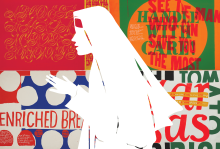
FOR SISTER MARY CORITA, the supermarket parking lot in Hollywood she walked through each day to get to her art studio was filled with “sources.” Grocery advertisements, power lines, cracks in the asphalt, songs from car radios—all of these, to her, were “points of departure” that, when examined in a new way, tell us something about ourselves and God. “There is no line where art stops and life begins,” she wrote.
Corita Kent, a Catholic sister described by Artnet as “the pop art nun who combined Warhol with social justice,” delighted in Los Angeles’ chaotic 1960s cityscape. Her serigraphs (silk-screen prints) wrestle with injustice, racism, poverty, war, God, peace, and love in bursting neon and fluorescent lettering, transforming popular advertisements and songs into statements of hope.
“To create is to relate,” Kent wrote in Footnotes and Headlines. “We trust in the artist in everybody. It seems that perhaps there is nothing unholy, nothing unrelated.”
“She broke barriers her whole life, but always with joy,” Nellie Scott, director of the Corita Art Center, told Sojourners. “People often call her the joyous revolutionary.”
Kent was born in Iowa in 1918 and raised in a large Catholic family. Her family moved to Hollywood when she was young, and at age 18, Kent joined the Sisters of the Immaculate Heart of Mary, who ran the high school she attended. She went on to teach art at Immaculate Heart College, becoming head of the art department in 1964.
The changes going on in both the art world and Catholicism excited and inspired Kent. In 1962, the year that Pope John XXIII convened Vatican II, Kent saw the first exhibit of Andy Warhol’s “Campbell’s Soup Cans” paintings and dove into the world of pop art. “New ideas are bursting all around and all this comes into you and is changed by you,” she wrote in Learning by Heart.

Dom Thomas Georgeon is the abbot of the Abbey of La Trappe in France. He spoke with Sojourners' Jenna Barnett. Françoise Le Gall helped with interpretation.
“IT WAS LIKE a part of us was burning. Before being a historical monument, Notre Dame is a church: a place where people are going to pray, celebrate the sacraments, and the presence of Christ in the middle of Paris.
Somebody from Italy asked me if the fire was a sign from God about the church in France. To see how the firefighters worked for days and days, risking their life to save the building ... there were Christians praying when the cathedral was burning, and there were other people saying, ‘I’m not Christian but this place is a part of my life.’ The cathedral was a symbol of Christ in the middle of this city, and a sign of a community brought together.
Some private forest owners were asking for donated oaks for the rebuilding of the Notre Dame. They had to be between 100 and 200 years, very straight, could not have knots on the trunks, and had to have a diameter between 60 and 80 centimeters. I spoke about it with the community, saying ‘We’ve been asked to contribute to the rebuilding of the frame of Notre Dame, and I think we should say yes.’
I blessed the trees in the forest—something very simple. I said a prayer for all the people who are working on the reconstruction of the cathedral, asking also for the blessing of God on our community in our participation in this process.
When the forestry expert told me that our two oaks will [help rebuild] the spire, I said, ‘Oh, I love it.’ Because there is an idea of elevation in our contemplative life—trying to elevate the world toward God. I don’t know where our oaks will be, but if we are at the bottom, a little bit hidden, we know that we will support the whole spire, as we are trying to support the world with our prayers.”
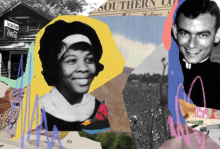
Who is scorched worse,
the one who dives to take the bullet,
the one who shoots,
or the woman spared?
Take Ruby Sales, for example—
how she and Jonathan Daniels,
thirsty from heat and the Hayneville jail
stop for a cold soda on their way out of town.
Deputy Tom Coleman is angry, is ready;
he aims his gun pointblank at Ruby.
Daniels sees it coming, pushes Ruby over
throws his body in bullet’s path.
Editor's note: Sales, founder of the SpiritHouse Project, is a nationally recognized human rights activist and public theologian. Coleman was acquitted of the death of Jonathan Daniels by an all-white jury and died in 1997.
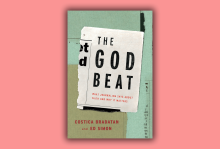
Ed Simon is co-editor of the anthology The God Beat: What Journalism Says about Faith and Why It Matters, which explores the New Religion Journalism movement—an offshoot of the New Journalism genre of the 1960s and ’70s that fused news writing with the storytelling techniques of novelists, memoirists, and poets. He discussed his book with Audrey Clare Farley, author of The Unfit Heiress: The Tragic Life and Scandalous Sterilization of Ann Cooper Hewitt.
AUDREY CLARE FARLEY: You claim New Religion Journalism emerged after 9/11, when it became evident that journalism had “a secularism problem.” Can you explain?
Ed Simon: For a long time a variation of the “secularization thesis” endured in an almost unspoken way. This assumption held that religion was a vestige of an archaic past, and that the future entailed its disappearance. But two decades later we know that religion isn’t going anywhere, and newsrooms had to adapt.
Does the secularism problem persist? Many say the media was blindsided by the rise of Christian nationalism. I think that it has a Christianity problem. By that I don’t mean anything as reductive as saying that journalists are belligerent to Christianity, but the opposite. When many hear the word “religion” they think Christianity, Protestantism, or even evangelical Protestantism. There needs to be a wider scope on what religion means.
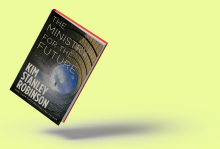
IT BEGINS IN the way the 2020s could end: with a climate change-driven heat wave that kills 20 million people in India. Kim Stanley Robinson’s work of science fiction is heavy on the science and light on the fiction. Indeed, the “fiction” of this novel reads more prophetic than futuristic. Just like biblical prophets, Robinson is less interested in predicting a far-off world than seeing our current world for what it is. The words of the prophet Jeremiah would fit snugly in this book: “Disaster overtakes disaster, the whole land is laid waste” (4:20).
Robinson’s vision of a response to climate change veers on the edge of technological utopianism without ever falling into the abyss. The airships, cryptocurrencies, and drones of Robinson’s novel are not simply fantastic simulations of a utopian (or dystopian) world. They are pragmatic responses to a world that is burning and melting under our feet. While the need for technological solutions is so apparent in Ministry (and in our own world), Robinson’s hope is not located in technology. Rather, the tentative hope of Ministry is found in the unwavering humanity of its many heroes.
